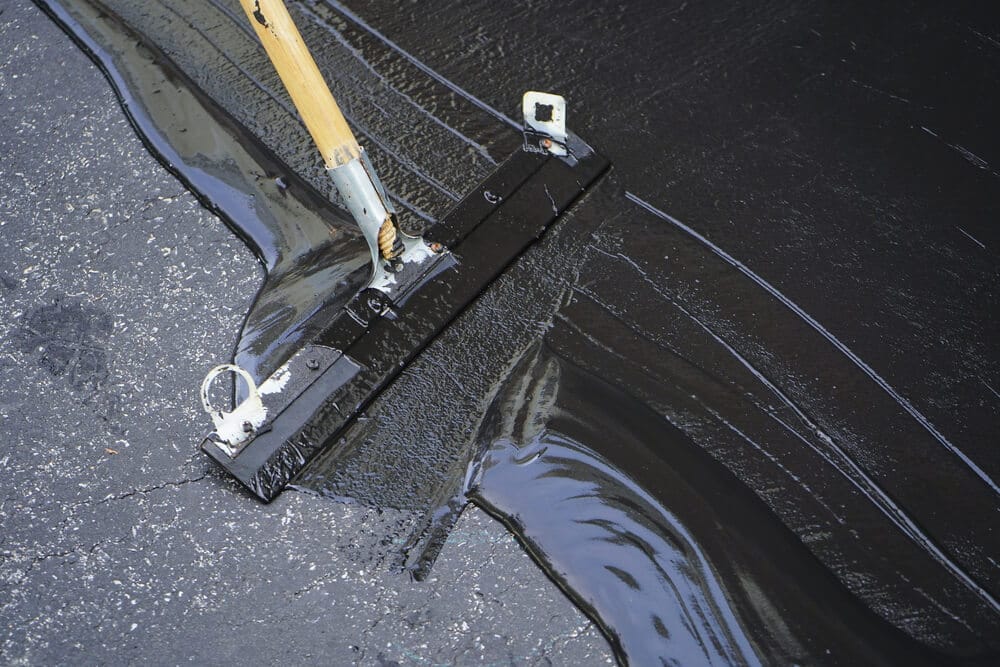When property owners pave their driveways or parking lot with asphalt, they want the pavement to last for many years. Unfortunately, weather fluctuations, frequent precipitations, environmental issues, and traffic tend to affect the integrity of the paved surface.
With the costs of repaving an average driveway being around $5,000, avoiding frequent repaving is on every homeowner’s agenda. Meanwhile, commercial building owners with large parking lots are even more interested in keeping repaving costs down.
That’s why asphalt paving experts recommend sealcoating the surface. A sealcoat offers an extra layer of protection to your asphalt, keeping bad elements from ruining the pavement for as long as possible.
Besides protection, a sealcoat also gives your asphalt pavement a fresh appearance. So can it ever be bad for your asphalt? Sometimes, it can. Let’s take a closer look at how it’s possible.
Poor Installation
Proper installation is the key to getting your asphalt pavement to last as long as possible. Some property owners mistakenly believe that DIY installation will turn out to be cheaper and less time-consuming than professional services.
In reality, unless you have sufficient experience with asphalt paving, you could make several unfortunate mistakes that will end up leading to extra expenses.
Meanwhile, DIY installation still requires professional equipment. Renting and handling this equipment without expert assistance isn’t just complicated. It can be dangerous.
Improperly installed asphalt isn’t going to last. So when you apply a sealcoat, you don’t make it stronger. Just the opposite, you can weaken the pavement. That’s why it’s imperative to opt for professional assistance no matter how easy the paving job may seem at the first glance.
Failure to Repair
No matter how much protection a sealcoat provides for your asphalt pavement, it can still get damaged. According to Tampa experts from CSG Sealcoating, high traffic, strong UV rays, falling branches, wind storms, and other elements can damage the paved surface.
A small crack or an oil spill can grow into a serious problem and result in a pothole. Besides being a danger to your household members and clients, potholes let the water inside the asphalt pavement. This, in turn, ruins it from the inside.
If you fail to repair asphalt damage quickly, sealcoating won’t help your pavement. You need to repair all the damage before applying the sealcoat to the pavement. When the asphalt’s integrity is excellent, a sealcoat adds extra protection. When it’s damaged, a sealcoat can only make matters worse.
Irregular Sealcoating
If you want to replace your asphalt pavement once every two decades, you need to apply a sealcoat regularly. Depending on how much traffic the pavement gets and how much damage it’s exposed to, you need to replace the sealcoat every one to three years.
Some property owners apply the sealcoat only once and believe that it will get the job done. In reality, the protective properties of sealcoating wear off with time. Eventually, you are relying on the protection that’s non-existent.
When you think that your asphalt is protected while it isn’t, you are putting it in danger of damage. In this case, sealcoating may be bad for the pavement since it gives you the wrong expectations.
Ask your asphalt paving contractor about the recommended frequency of resealing. Follow recommendations closely.
Lack of Maintenance
Some homeowners mistakenly believe that the sealcoat doesn’t need to be maintained. They apply a sealcoat and believe that the asphalt is safe. In reality, sealcoating offers protection as long as you maintain it properly.
You need to inspect the sealcoat at least once a week for damage, dirt, and debris. If the pavement is dirty, clean it up. Otherwise, dirt and debris could work slowly to crack the sealcoating, letting the moisture inside your asphalt pavement.
If you don’t maintain the sealcoat well, it will wear off quickly, thus putting your driveway or parking lot in danger.
Final Thoughts
While by itself, sealcoating can’t be bad for your asphalt, it may cause homeowners to make wrong conclusions about the integrity of their asphalt pavement. A sealcoat is a protective layer that requires proper installation and maintenance.
With a professional approach to sealcoating and regular resealing, you can keep your asphalt intact for many years.


